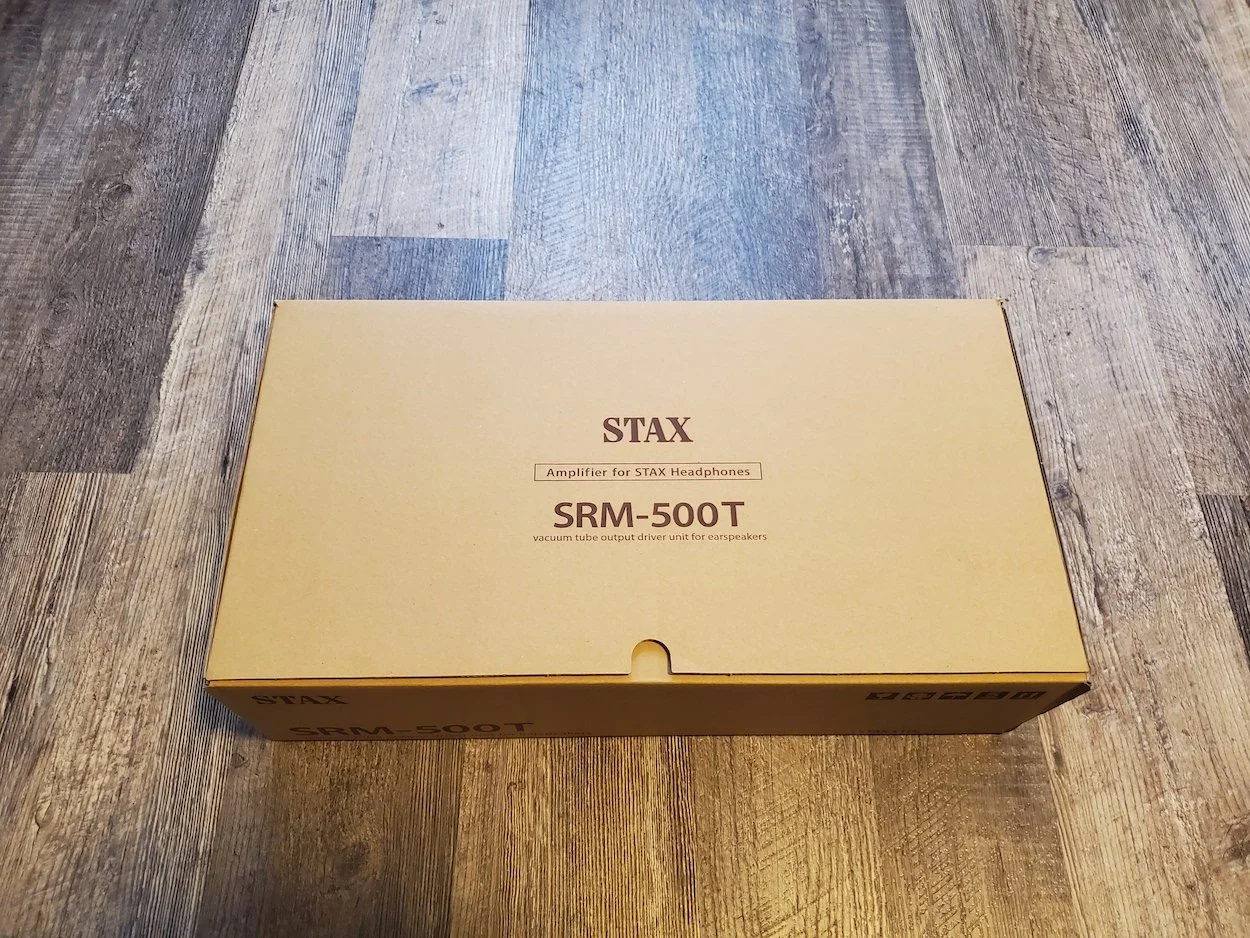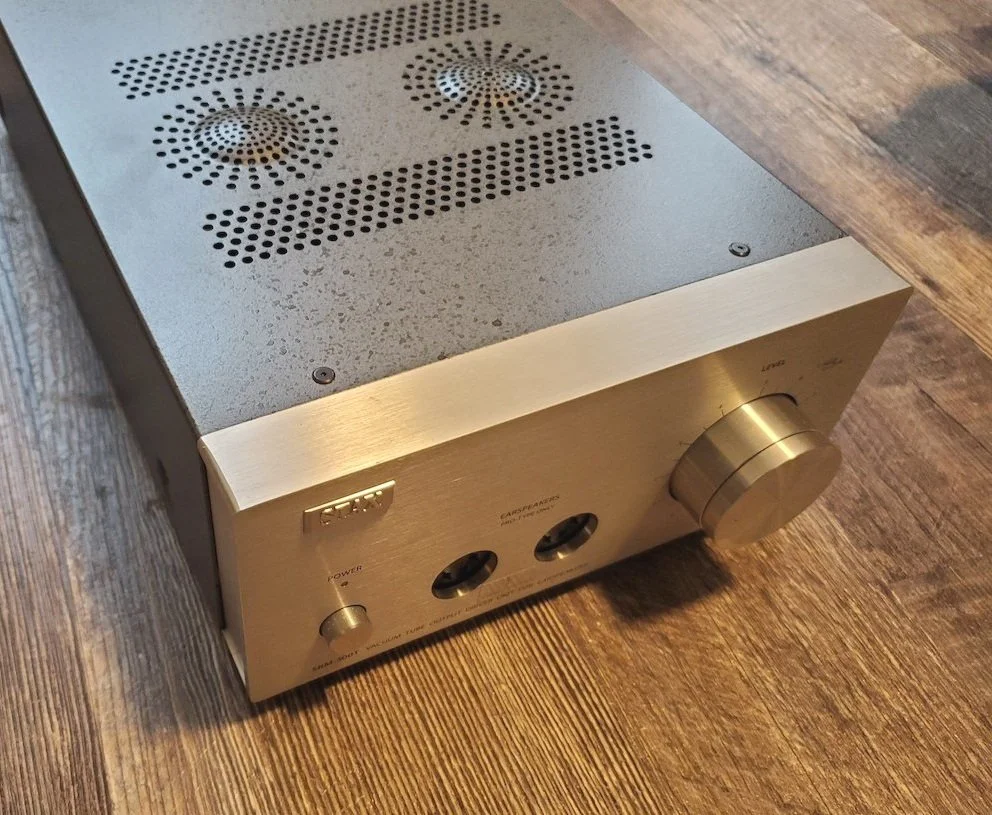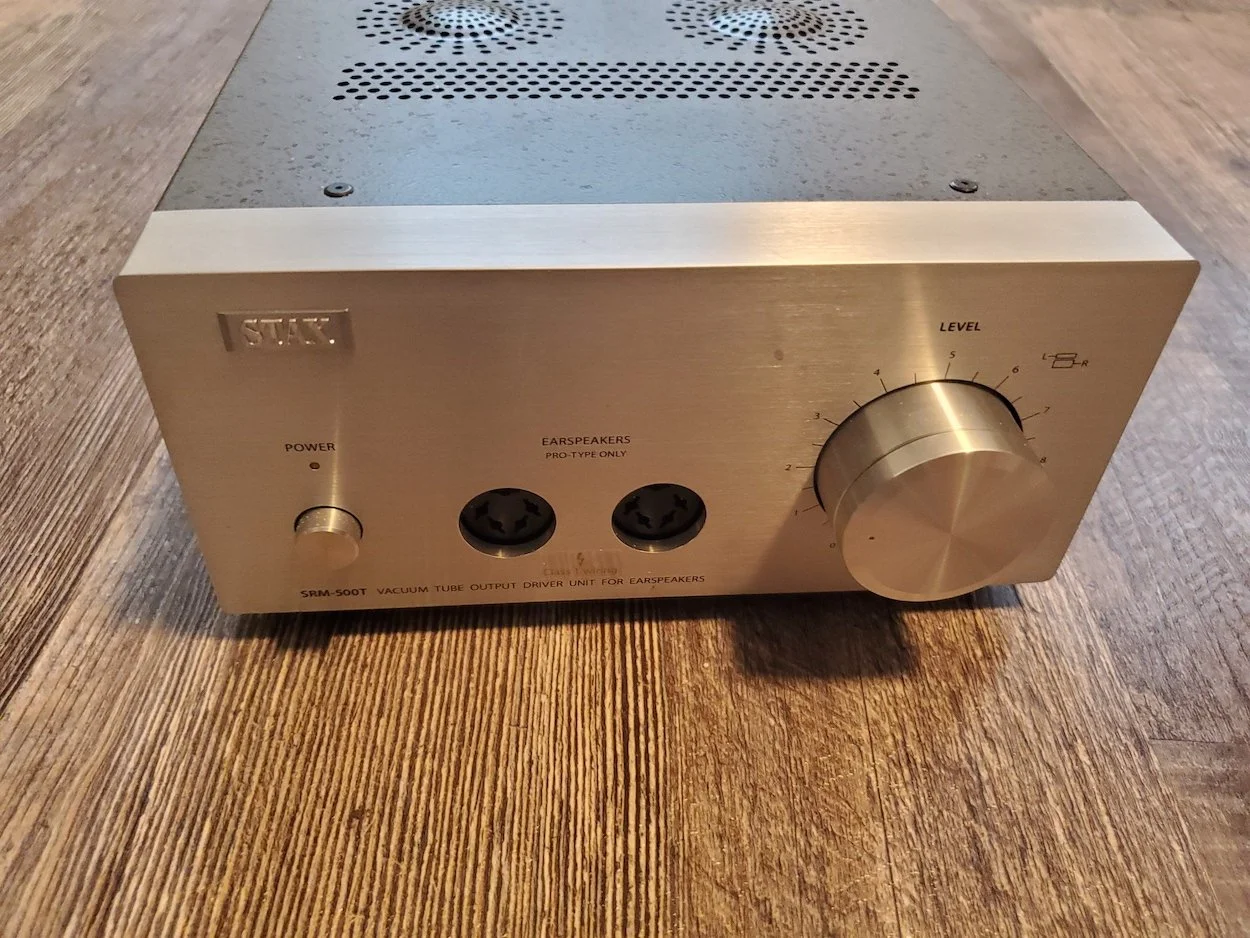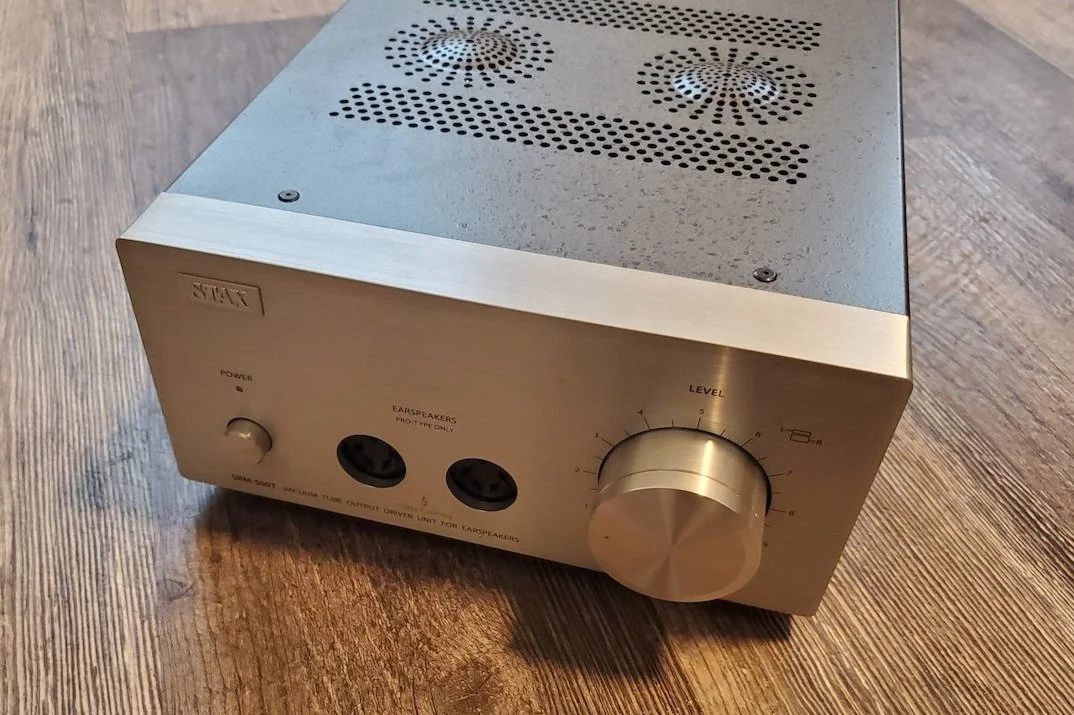STAX SRM-500T - REVIEW
A Diminutive Highly Musical Electrostatic Headphone Amplifier!
With this review and the next—STAX SR-X9000—I travel back to the world of electrostatic headphones and headphone amplifiers. In many respects, it is a journey that I always look forward to, though my recent return from this world found me discovering two rather incredible headphones—the Meze Empyrean Elite and the ZMF Atticus (see reviews). I found them both incredible and incredibly addictive with their own inherent strengths, and the fact that each evidenced electrostatic qualities, to greater and lesser degrees, respectively, was mind boggling. The cynic in me was made to see reason and a new emerging truth.
As I wrote in my review of the STAX SRM-700T:
“I will first say that I did not expect much from the SRM-700T given its “power” tube compliment of 2-6SN7s, which are not traditional power tubes. And the 6SN7 powered amplifiers that I have actually heard did not sound very good at all, and that would be the kindest thing that I could say about them.”
Suffice to say, that the SRM-700T was exceptional in every way a headphone amplifier is supposed to be and it rose far above my expectations to…, yes, win yet another award for the 80 plus year old company. Apparently, STAX’s continual refinement, its trickle-down technology from successive generations of components, and its unwillingness to compromise find it at the apex of electrostatic component design.
This brings us to the current review of the STAX SRM-500T ($1340). The SRM-500T like its older sibling—STAX SRM-700T—is a hybrid design utilizing both tubes (old school) and solid state FETs. The SRM-500T is a new offering from STAX in an attempt to lower the barrier to entry for those curious or those long fascinated by electrostatic headphones and headphone amplifiers. And, by the way, you can’t have one without the other.
Upon receipt of the STAX SRM-500T and with a rather long queue of reviews for the January 2022 issue of the AudioKeyREVIEWS! Magazine, I sat it aside for a bit though I was curious and quite a bit anxious to discover its abilities and especially at its price point!
When the time came I unpackaged it (again, sorry, no video), set it up on its own elevated stand, plugged it into the system—DENAFRIPS Pontus II, MacBook Pro (running ROON), and let it warm up for a couple of days. As it was a demo with, no doubt, a good many hours on it, it wouldn’t need extended burn-in.
And shortly thereafter, I got down to listening…
This like the paragraph below is becomes somewhat of a refrain, so often have I traveled to the electrostatic world of reviewed components, primarily of the STAX company. STAX, which began operations in 1938, has held forth for over 80 years, creating, improving, and introducing its various electrostatic products, which continually find high praise across the world. Its fans loyal, its products having withstood the test of time, the various STAX components are often considered heirlooms to be passed on to the next generation.
REFRAIN: Unlike most reviews, this review will be non-sequential, as it will start, below, with how the equipment actually sounds and not the process of physically “undressing” it and/or laying out its various parts, specifications, etc. Think of this review then, as a non-linear movie—Memento, Kill Bill, Arrival, Eternal Sunshine of the Spotless Mind, The Terminator, In the Shadow of the Moon, The Queen’s Gambit, etc—that, likewise, starts at the end and winds its way to the beginning.
The Sound
First, the balanced connection is always the way you’ll want to go with STAX headphone amplifiers/energizers as this allows for the least amount of noise and the greatest level of detail retrieval.
The STAX SRM-500T represents the trickling down of technology from its older and higher priced siblings—SRM-T8000, SRM-700S, SRM-700T. And while there are some distinct family resemblances, the SRM-500T will not reach the bass depths, not the treble heights of its siblings, but what it handles in its frequency range will be very well rendered and very musical.
Its transparency will be very good as well: it is, after all, an electrostatic headphone amplifier. Though paired with the proper headphone—STAX SR-L700MkII—the combo will easily tease out even more transparency and resolution and good amounts of detail. And transient speed via the combo will be second only to its various brethren and, perhaps, to a decidedly more expensive traditional headphone amplifier coupled to a very good dynamic or planar headphone.
The STAX SRM-500T, as mentioned above, is a hybrid design, which means it employs both solid state and tube stages. In this respect, the SRM-500T delivers what tube amps are, in general, known for—musicality and the rendering of three-dimensional space. And it also delivers what solid state amplifiers are known for—tighter control of the bass, detail, notable transient response, and good dynamics. And this was certainly true of the STAX SRM-500T, across a range of musical genres.
The STAX SRM-500T’s volumetric cube—its soundstage—is of a good size and it will fix entertainers and musicians firmly in space and at good depth across the soundstage. Certainly, given its entry-level price point, one would have to spend a great deal more to approach or better it. In general, the components of an electrostatics’ DNA are transparency, treble extension, transient speed, and musicality. A check here too for the SRM-500T’s abilities.
The STAX SRM-500T was paired to the STAX SR-L700MkII ($1795), one of its natural matches, though the STAX SR-L500 MKII ($830), and the STAX SR-L300 ($455) are also considered the natural companions of the STAX SRM-500T if not its BFFs.
Bass
The SRM-500T could not reach at all to stygian bass-head-depths, and bass, in general, was good though never did it rumble, regardless of the electrostatic headphone that it paired with. And powerful, dramatic passages were often left wanting. That said, most music and the level of bass that it contains will be easily and readily handled by the SRM-500T, as it does, in fact, have good bass response.
Midrange
As with all STAX electrostatic headphone amplifiers the midrange is yet another place where the magic lives and it is always beautifully rendered. The STAX SRM-500T handles the midrange beautifully in how it renders timbre, tone, and texture in a rather sublime manner. The SRM-500T offers good transparency, though it is not quite as good as those STAX electrostatic headphone amplifiers above it. And therein lie the sacrifices that must be made for keeping to a certain price point. Yet despite this, its midrange performance is rather exceptional, as well it should be. Those entirely new to the electrostatic world may well be entranced and en route to becoming a citizen of another world.
Treble+
The treble is very natural, completely free of any sibilance or harshness or grain. Resolution is also quite good and cymbals will resolve as cymbals and not the irritating “Schchccccccsssh” sounds that come from components that render this upper band poorly to horribly. And there are systems and components from the very inexpensive to the prodigiously expensive that err with regard to this one simple requirement—let cymbals be cymbals and not as a friend would say, “The sound of paint cans spraying paint.” The STAX SRM-500T, however, passes this test with flying colors!
The Wrappings and Accessories
The STAX SRM-500T comes in a simple brown cardboard box, with each of its sides printed with the energizer’s designation. Inside, styrofoam cutouts hold secure and provide protection for the 500T electrostatic headphone energizer.
The included contents are the STAX SRM-500T, a stock power cord, stock interconnects, an instruction manual, and a warranty card. You’ll want to lose the stock power cord and interconnects and get very good aftermarket cords. I have suggestions for you.
Design—Look and Feel
The STAX SRM-500T, like its siblings, sports a rather traditional design—clean, purposeful, minimalist—with an anodized, aluminum facade and a gray-coated, steel body. The SRM-500T’s top features two, small, vented, convex mounds, directly above the two 6FQ7/6CG7 internal tubes, for cooling. These mounds sit between the cooling vents for the SRM-500T’s interior. The SRM-500T measures 195W x 102H x 376Dmm.
The STAX SRM-500T is diminutive, well executed, and built to last, which so very many STAX energizers have apparently been built to do—to last. The SRM-500T’s design is straightforward and clean and purposed—it plays music beautifully.
Functionality
The STAX SRM-500T is a hybrid—tube (6FQ7 / 6CG7) and solid state (FET)—electrostatic headphone amplifier, which means that it can only be utilized with electrostatic headphones.
The SRM-500T amplifies the signal which it receives from a source—DAC, CD player, phono-pre, etc—and passes it on.
Its front panel from left to right features an on/off button with an indicator orange indicator light above it, that flashes when first turned on and continues to flash until warmup is complete. Next to the on/off button are dual, 5-pin, electrostatic headphone outputs. And on the far right is a large volume knob.
Its back panel features two inputs—a balanced set (XLR) and a single-ended set (RCA). It also incorporates a Parallel Out which allows you to connect it to another system. There is a selector switch on the back, a grounding post, and an IEC socket (power plug).
The STAX SRM-500T drove all of the electrostatic headphones with a 5-plug connector, that were in-house and it did so, relatively, easily.
The Specifications
STAX SRM-500T
Type: FET + vacuum tube output hybrid DC amplifier configuration / driver unit
Vacuum tube: 6FQ7 / 6CG7
Frequency response: DC to 90kHz (when using one SR-L500 MK2)
Gain: 60dB
Harmonic distortion rate: 0.01% or less (at 1kHz / 100V r.m.s. output)
Input impedance: 50kΩ (RCA), 50kΩ x 2 (XLR)
Maximum output voltage: 300V RMS (1kHz)
Bias voltage: DC 580V
Operating ambient temperature / humidity: 0 to 35 ° C / 90% or less (however, no condensation)
Input: RCA x 1 XLR x 1
Output: RCA out
Power consumption: 38W
Dimensions: 195W x 102H x 376Dmm (including protrusions such as knobs)
Weight: 3.4kg
Conclusion
The STAX SRM-500T serves as a middling-level entry point above its lower priced siblings—the SRM-400S ($1180), SRM-D50 ($1200), and the SRM-D10 ($945)—and is the only one of them that utilizes hybrid amplification.
No doubt, the SRM-500T was STAX’s way of saying this was constructed for those new to electrostatics, for whom it may serve as a beacon to a world that is immensely charming, musical, and communicates as if a breath of fresh air. There will also be those, who see the STAX SRM-500T as but the point of entry to this world. Their sights will, no doubt, lead them farther into this incredibly beautiful, transparent, and detail rich electrostatic world.
We, AudioKey Reviews highly recommend the STAX SRM-500T for those new to electrostatic headphones and amplifiers, as it will serve as either a longtime companion, perhaps for most, while for others, the first friend in a journey across an electrostatic world where a more ‘kindred’ musically adept electrostatic friend may, indeed, be found. Happy world hopping and happy befriending!
The Systems
1.
Roon Nucleus+
DENAFRIPS Pontus II
Dan Clark VOCE
STAX SR-009S
STAX SR-L700MkII
ANTI-CABLE cabling and wires
TORUS TOT MAX
2.
Roon Nucleus+
Border Patrol SE-i DAC
Dan Clark VOCE
STAX SR-009S
STAX SR-L700MkII
ANTI-CABLE cabling and wires
TORUS TOT MAX
3.
Roon Nucleus+
Border Patrol SE-i DAC
Dan Clark VOCE
STAX SR-009S
STAX SR-007A
STAX SR-L700MkII
ANTI-CABLE/CARDAS cabling and wires
TORUS TOT MAX
THE MUSIC
The Company
STAX
STAX SRM-500T $1340
STAX
#2101 The L Plaza
367-375 Queen’s Road Central
Hong Kong
+852 2522 6989
cs@staxheadphones.com







